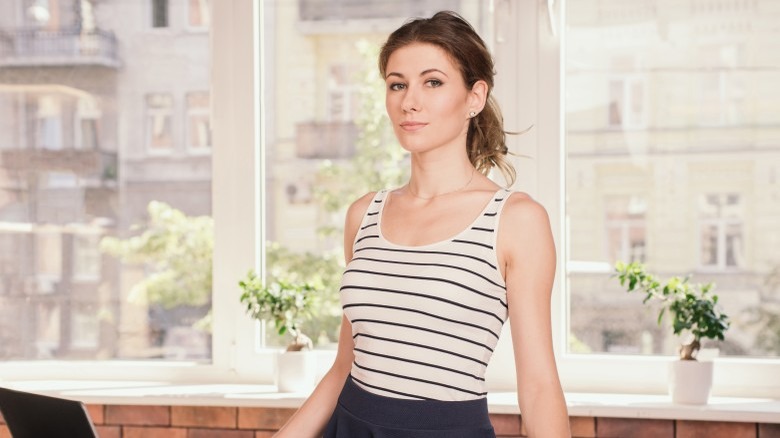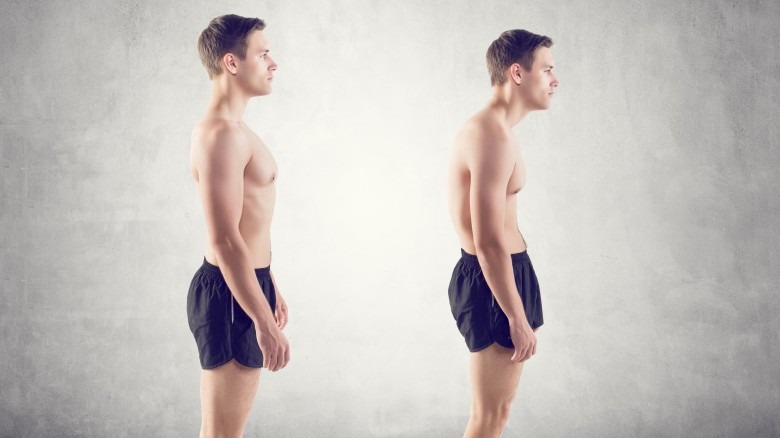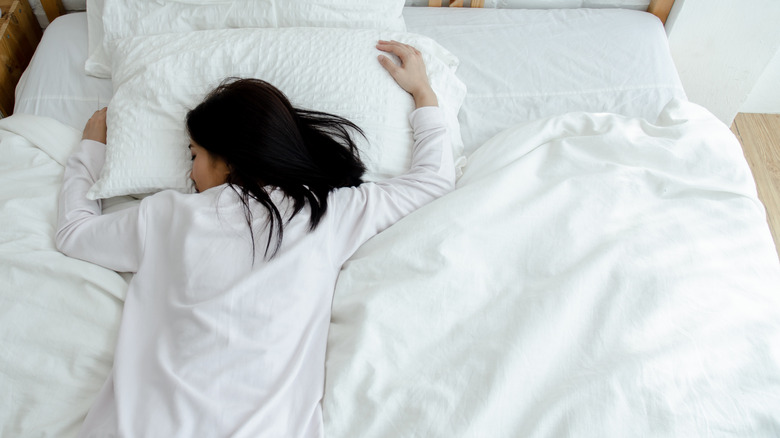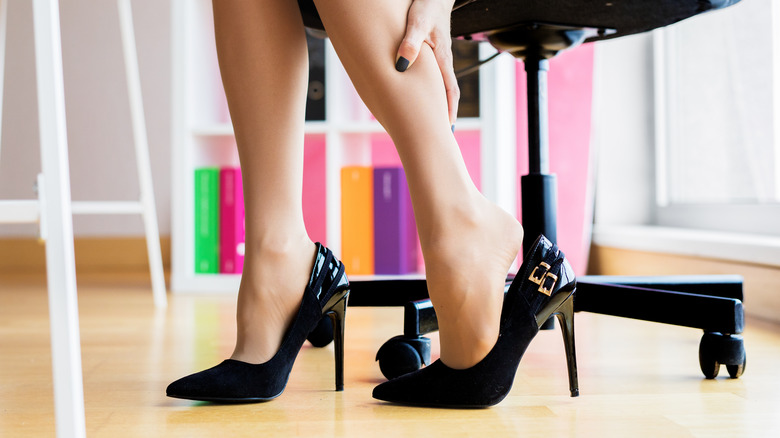Posture Mistakes That Make You Look Older
Everyone has been corrected for posture mistakes and probably told to sit up straight at some point in their lives, likely by a concerned parent or watchful schoolteacher. There's a good reason for that, as poor posture can cause a variety of ailments, such as headaches, neck pain, back pain, and more, according to WebMD. That's why it's good to be aware of how you hold your body when you're sitting or standing for long periods of time.
What you might not have realized about your posture, however, is that it can make you look a lot older than you actually are if it's bad. Indeed all of that slouching, leaning, and hunching is doing you no favors, even though it may feel more comfortable and natural than truly sitting up straight.
So what are some of the most common poor posture habits that are adding years to your skeleton? Read on to find out.
Why does good posture matter?
Good posture leads to a mountain of positive changes. Standing and sitting up straight take pressure off our muscles and joints. It also leads to a strong core and back.
In addition to all of the physical benefits, good posture just makes you feel better, as sitting up tall can help alleviate stress. Studies have also linked good posture with increased self-confidence. In a study from Ohio State University (via Science Daily), researchers found that study participants who sat up straight were more likely to believe that they were qualified for a job than their slouching peers.
Good posture can even help improve or prevent depression. "We tend to think the brain and body relationship goes one way. In fact, the passages go both ways," San Francisco State University professor of Health Education Erik Peper told SF State News. "When you choose to put your body in a different mode, it's harder to drop into depression." So essentially good posture can trick your brain out of being depressed — that's all the reason we need to avoid posture mistakes!
Wondering if you're experiencing depression? Here are depression symptoms you need to know about.
Slouching in your chair is a big posture mistake to avoid
Slouching in your chair is a quick way to start looking older than you are. Sitting this way puts strain on your sensitive back muscles, pulling them and causing soreness. When your muscles are sore and fatigued, it's natural to just keep slouching over, making you look older.
Slouching in your chair could mean the height of it is too high or low, as noted by CBC's Steven and Chris. When your chair is too high, your legs dangle. Sure, this could make you look younger like a little kid, but, if you do it too long, you'll be looking much older. This dangling is a posture mistake that can lead to decreased circulation in your legs and can even lead to varicose veins. Hello, Grandma! If your chair is too low, leaning forward in it can put stress on your low back and even lead to disc issues. And always talking about your herniated disc is definitely going to make you seem older.
Fix your slouching by fixing your chair. If your chair is adjustable, make sure your feet are on the ground and that both your hips and knees are at a 90 degree angle. Mayo Clinic advises to avoid crossing your legs and keep your ankles slightly in front of your knees. Even better, make sure you're taking plenty of walking breaks throughout the day.
Don't do this posture mistake of slouching while standing
When we slouch while standing up, we create a flat low back as we sit into our hips. This causes our head and neck to lean forward, putting stress on the neck, as noted by U.S. News and World Report. It also gives us that "old lady" stance. To stand up tall, it's important to have a strong core, back, and glutes to hold our bodies upright. Work on core-strengthening exercises like planks to help hold you up taller.
This hunching forward can also lead to rounded shoulders. Not sure if you've been doing this posture mistake? Stand in front of the mirror and let your arms hang at your sides. If your knuckles naturally face forward, that means your shoulders are already rounded. Work on stretching your chest muscles and strengthening your upper back to offset this.
Hunched at the computer? You're committing a major posture mistake
Hunching over your computer or phone may make you look like a teenager at first, but it will quickly age you. Hunching usually comes from a weak upper back and tight chest muscles, according to NHS. Hunching over your phone or computer can lead to upper and lower back pain, as noted by CBC's Steven and Chris. This posture mistake can also lead to painful trigger points or muscle "knots" in your upper back. Do this every day, and you'll start to develop a rounded upper back, giving you a slight humpback look. Once you develop your humpback, all you'll need is a walker to complete the look of someone decades older than you.
To combat this hunching that we all do, work on stretching the front of your body and strengthening the back.
Leading with your chin is a posture mistake best avoided
Most of us are guilty of leading with our chins when we're staring at the computer, which is a big posture mistake. Your upper body leans forward while your head looks up at the screen, causing our chin to come forward. "When you look up at a monitor that is too high, the neck is forced to extend," chiropractor and wellness expert Dr. Kyra Gerber told CBC. "This compresses the joints in the neck and causes fatigue in the muscles, which could lead to inflammation, pain and headaches."
Fortunately this one can be solved with a simple redesign of your workspace. Make sure your chair isn't too low and your screen isn't too high. You should be able to sit up straight and look straight at your screen, keeping your neck in a neutral position.
Cradling your phone with your neck is a posture mistake that prematurely ages you
It can be tempting to cradle your phone between your neck and shoulder if your hands are otherwise occupied, or if you're on the run when you take a phone call. If you've ever worked in an office answering phones, certainly you've been guilty of this posture mistake on at least one occasion in an attempt to multi-task.
But that's not a healthy habit to get into, as it can cause you to have hunched shoulders, according to Healthline. And that, in turn, is going to make you look older, instead of young and healthy with straight shoulders and good posture. So use a headset or headphones if your hands aren't going to be free to take a call.
Even scarier is that if you spend long periods of time cradling your phone, you're putting yourself at risk for dire health problems like a stroke, according to The Guardian. That's what happened to a French doctor who had a mini-stroke after doing just that during a long phone call. Yikes!
Do you like to work from your couch or bed? That posture mistake can add years to your body
Fewer things are nicer than sinking into the couch after a long day of work or falling into your super comfy bed when you're tired. As long as you're getting enough exercise during the day, there's absolutely nothing wrong with vegging out for a while, so your lazy nights watching shows like Stranger Things and GLOW on Netflix aren't going to hurt you.
The problem arises when you bring a laptop into the equation, according to Dr. Charla Fischer, an orthopedic spine surgeon. She told NBC News that working in bed or on the couch can cause your posture to get awkward, even causing you pain as you look at the computer in your lap. Kind of reminds you of some elderly folks who are permanently looking down, huh?
The same applies when you're looking down at your phone too much, which can exacerbate spinal compression. That posture mistake can shave inches off of your height over time, said physical therapist Dr. Karena Wu, according to NBC News.
Sleeping the wrong way is a posture mistake that can make you look older
Most people will tell you that they prefer sleeping in a specific position; some folks prefer sleeping on their sides, while others can only conk out when they're on their back. Given that most people spend a lot of time in bed — eight hours per night, if you're lucky — that's a long time to spend in a given position.
But not all sleep positions are created equally, as the best positions are those that ensure your spine is as straight as possible, says spine and neurosurgeon Dr. Sheri Dewan. She told NBC News that sleeping on your stomach is one posture mistake that can strain your neck and lower back, and recommends getting a firmer mattress if that's the only way you can rest. Nothing says beauty and youth like wincing every time you turn your head the wrong way!
If possible, try sleeping on your back with a pillow under your knees, or on your side with a pillow between your legs. Both of those are better for your back, noted Dewan.
Carrying a heavy backpack can take its toll on your posture, which ages you
Backpacks aren't just for schoolchildren and teenagers, as they can help you lug all kinds of items around without the use of your hands, which is extra handy while hiking. Plus backpacks are better for your posture than messenger bags, heavy purses, and shoulder bags, says Dr. Neel Anand, an orthopedic surgeon. "When worn correctly, the weight is evenly distributed across the shoulders and the back, reducing the risk of shoulder or neck strain that can sometimes result from carrying a purse or any other bag on just one side of the body," he penned in an article in U.S. News & World Report.
But once you start wearing your backpack incorrectly, or packing it too full of heavy items, the benefit goes out the window. "When the muscles surrounding the spine get used to being treated this way, they tend to more easily 'remember' this position, creating a habitually lousy posture," Anand added. So even though carrying a backpack might be the young thing to do, hunching over all the time certainly isn't, and it's one posture mistake you'll want to avoid.
Be careful how you pick things up, or you might add years to your body because of a posture mistake
If you've ever attended a work safety training or worked with a personal trainer, you're probably aware that there's both a safe way and an unsafe way to lift heavy things. That's why it's important to bend your knees (not your back), keep your chest forward, and hold the object close to your body when you're lifting weighty items.
If you don't observe this protocol, you could very well injure yourself, as noted by physical therapist Ron Miller. "Getting out of position during lifting can put a great deal of stress on the lower back muscles, and when the demand is too high on a muscle it can be injured," he wrote in an article in Spine Health. Even worse, you can hurt a joint or rupture a disc, he added, which can cause a tremendous amount of pain and inconvenience.
So unless you think having a back injury enhances your youth, be careful to avoid posture mistakes when you lift.
If you wear the wrong shoes, you can end up looking older than you are because of a posture mistake
When you want to look young, confident, and sexy, which shoes do you reach for first? Why high heels, of course, as nothing goes quite so well with both your little black dress — a wardrobe staple — and your custom-tailored power suit.
Unfortunately, no matter how much you love your pumps, they can cause damage to your posture, says chiropractor and shoe designer Dr. Liza Egbogah. "High heels, especially those over 3 inches, do not help you stand up straight," she explained to Footwear News. "Instead, they cause your pelvis to tilt forward, accentuating the curve in your lower back." She added that this can cause muscle strain as well, which forces your body to overcompensate in order to stand up straight. Yes, you can add this to the reasons to ditch your high-heeled shoes.
So in order to avoid aging your skeletal structure with this posture mistake, Egbogah recommends getting custom orthotics for your high heels or wearing "supportive walking shoes" instead.
Standing all day? That's a posture mistake that might add years to your frame
By now you've probably heard that sitting too much is a posture mistake that can cause a variety of health problems, something confirmed by the Mayo Clinic. Perhaps that's inspired you to take up an exercise regimen if you have a sedentary job, or invest in a standing desk in order to reduce the amount of time you spend stuck in a chair. More power to you!
But if your job demands that you stand in one place all day, that can damage your posture if you're doing it incorrectly, according to the American Chiropractic Association. So in order to avoid injuries that can make you look a lot older than you are, keep your knees bent a little, make sure your weight is mostly on the balls of your feet, stand up straight with your shoulders back and feet shoulder-width apart, and activate your core to support your spine. You can also shift your weight from toe to heel, one foot at a time to preserve good posture.
Bad posture makes you feel weak
Shrinking down in bad posture not only makes you look older, but it actually makes you look and feel weak. Across all species, posture sends a message about power, as noted by Scientific American. When you stand up straight and look the world head on, you look like a force to be reckoned with.
A study in Psychological Science found that standing up straight and taking up more room with your posture, such as with hands on your hips instead of hanging at your sides, made study participants feel more powerful. Standing this way even changed their hormone levels. Participants had elevated levels of testosterone and lower levels of cortisone. This means they were feeling more powerful and less stressed at the same time — just by standing up tall! So, why not avoid the posture mistake of slouching and instead stand proudly?
Posture mistakes can make it hard to breathe
If you've ever felt fatigued running up a flight of stairs or racing to the door, don't just chalk it up to age. We often think any health change is just what happens when we're not a teenager anymore or perhaps we're out of shape. However, shortness of breath, achy muscles, and even acid reflux could actually be coming from posture mistakes!
"Headaches and tension in the shoulders and back are often created by chronic bad posture," Peggy W. Brill, a physical therapist based in New York City and spokesperson for the American Physical Therapy Association, told Today. "If you're slouching, you may also have gastrointestinal reflux or feel fatigued because you're unable to breathe deeply." Make sure you're giving all your vital organs room to breathe by standing up tall.
Check your posture
If you're concerned about your posture, the Mayo Clinic recommends using the "wall test" to see how you're doing. Stand with your back against the wall, making sure your head, shoulder blades, and bum are touching. Next slide a hand between your low back and the wall. Ideally, there should barely be enough space to fit your flat hand. If there's more room, it means you're arching your back too much. If your low back is already right up against the wall, gently move it away so you can fit that flat hand. Once you achieve your perfect posture, step away from the wall keeping your alignment. You can try this throughout the day to reset your posture.
The best way to fix any posture mistakes is to make sure to check your posture throughout the day. The longer you hang out in a slouched, hunched over position, the more damage you'll do and the harder it will be to reverse. "Correcting your posture may feel awkward at first because your body has become so used to sitting and standing in a particular way," physiotherapist Nick Sinfield told the UK National Health Service. "But with a bit of practice, good posture will become second nature and be one step to helping your back in the long term."
How to prevent posture mistakes
First take a look at the activities you do every day. If you must sit at a desk for work, make sure your chair is nice and high so you're not having to look up at your screen. Aim for having the address bar at the top of your screen at your eye level, as noted by CBC. Working with a laptop? A stack of books under it could be just the thing to bring it to the right height.
Next keep your keyboard close to your body to avoid reaching forward. Also, our bodies are meant to move, so make sure to take plenty of standing and walking breaks.
Finally, we also need strong muscles to hold our bodies upright. Make sure to fit stretching and strengthening into your week. Yoga is perfect for this and really focuses on proper posture and alignment. Keep those muscles moving and grooving — and avoid all posture mistakes — if you want to keep that youthful look.
















